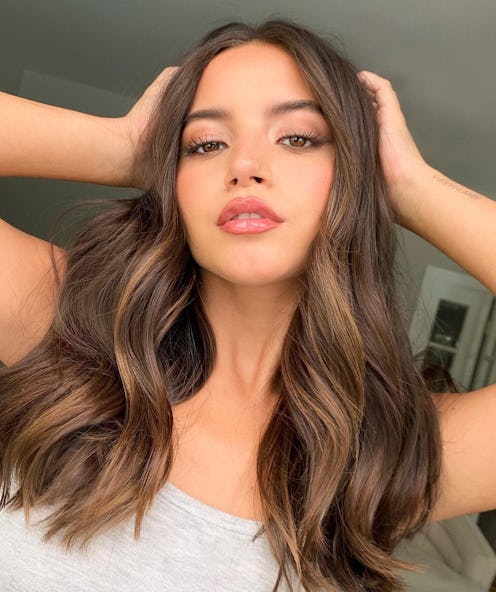(Hair)
Breaking This Habit Will Help You Kiss Greasy Hair Goodbye For Good
An expert-approved routine for oil-free hair.

No matter how much time you spend on washing or styling your hair a week, repeatedly winding up with greasy hair can frustrate anyone, especially when you don’t know what’s causing it. “The scalp, like the rest of the skin, contains sebaceous glands to produce sebum that protects the scalp from damage and environmental stressors” shares Dr. Anar Mikailov, MD, FAAD, board-certified dermatologist and co-founder of Skintensive. However, too much sebum could cause dandruff, excess grease, and limp roots — especially if you have fine, straight hair (type 1) that doesn’t require as much moisture as coils and curls (types 3 and 4).
Luckily, greasy hair can be rectified. A couple tweaks and updates to your routine will give your hair the adequate level of shine without it looking oily or weighed down. Meaning, no more less than glamorous hair days or frantically over-washing your hair. To help you out, TZR spoke with five celebrity hairstylists for their top tips on treating and preventing greasy hair. The experts are also sharing the many causes of excess hair oil and the best products to add in your routine today. Follow along for healthier hair days ahead.
What Causes Hair To Become Greasy & Oily?
Overwashing
The most common cause of greasy hair is over-shampooing or using a shampoo that’s too clarifying. “For those who over-shampoo (daily shampoo friends) you are basically telling your scalp it is not doing it's job and it over-produces oils to help protect your scalp,” says Sabrina Rowe Holdsworth, celebrity hairstylist and founder of NTRL by Sabs. “When you wash your scalp you remove sebum, the skin’s natural oil, stimulating the scalp to produce more sebum in response,” adds Dr. Iris Rubin, dermatologist and founder of SEEN Hair Care.
Stripping Products
Shampoos that contain some harsh surfactants can strip the hair and scalp of its natural oils by opening closed hair cuticles, allowing moisture to evaporate out. “Certain ingredients like silicones tend to leave more product build up, and have the potential to leave the scalp and hair feeling greasy,” Dr. Rubin adds.
Poor Shampoo Technique
In addition to over-shampooing, you could also be shampooing incorrectly. Holdsworth recommends shampooing at the roots only (using conditioner at the ends only) and allowing the shampoo to rinse down the rest of the hair. “A lot of people are shampooing all wrong and over-drying the strands in the process — leading to grease,” the expert tells TZR.
Shampooing With Hot Water
And although a nice hot shower is a great remedy after a long day, high temperatures could also be causing grease. “Over exposure to hot water can result in dry skin and over-production of oil to compensate,” says Harry Josh, celebrity hairstylist. To combat, stick to medium-warm temperatures and rinse hair with cold water to close up the cuticle and restore shine.
How Do You Treat Greasy Hair?
For long term effects, you can treat your hair with a weekly apple cider vinegar rinse. By mixing apple cider vinegar and water into your roots and strands, it will help absorb excess oil without stripping your hair and scalp. For more of a quick fix, Holdsworth advocates for salt sprays, dry shampoos, and volumizing powders at the roots. “These types of products will absorb unwanted oil and help you give the hair some shape and control in your chosen style,” the expert tells TZR.
In general, Dr. Mikailov recommends looking for products that are formulated with ingredients like salicylic acid, burdock root, and nettle that can help regulate sebum. Hydrating ingredients like aloe, vitamin B5, beta-glucans, eucalyptus, and moisturizing plant-based oils can help balance the scalp, as well.
What Hair Routine Helps Prevent Greasy Hair?
Cut Down On Shampoos
The experts all propose a bi-weekly wash routine for textured hair and every two to three days for all other types. “Having straight and slightly wavy hair, type 1 and 2A, can significantly increase the chances of having greasy hair due to the oil traveling easily straight down the hair shaft, as opposed to curly hair which does not,” says Whitney Eaddy, celebrity stylist and founder of Juices & Botanics.
Use Moisturizing Products
“A common oily hair misconception is to stay away from hydration,” Dr. DiAnne Davis, board-certified dermatologist shares when recommending moisture-boosting shampoo and conditioner to add in hydration. “But by doing so, oil glands will work overtime to produce moisture that the hair lacks — causing grease.” Essentially, adding in moisture to your routine will balance out natural oils and limit your oil glands from over-producing. When it comes to styling products, Holdsworth encourages you to massage and brush in products to disperse oil throughout the scalp and hair (which will help to properly moisturize your locks), versus just spraying in and calling it a day.
Use Scalp Detox Treatments
And speaking of product, be conscious of product build up. Add in a weekly or bi-weekly scalp detox treatment to rid your scalp of product residue, freeing it up of less-greasy roots and strands. Scalp detox treatments will also stimulate the roots for an overall healthy appearance (whether professional or an ACV rinse).
Clean Your Brush Regularly
Your favorite hair brush can unfortunately be home to all your product residue if you don’t clean it of old hair. “Brushes, our fingers, and our products all have oils that can grasp to our strands,” says Eaddy. He recommends actively cleaning your brush and combs, as well as avoiding using your fingers to run through your hair if you’re struggling with excess greasiness.
Ready to finally experience grease-free hair days? Ahead, the experts dish out their favorite products to add into your routine.
We at TZR only include products that have been independently selected by our editors. We may receive a portion of sales if you purchase a product through a link in this article.